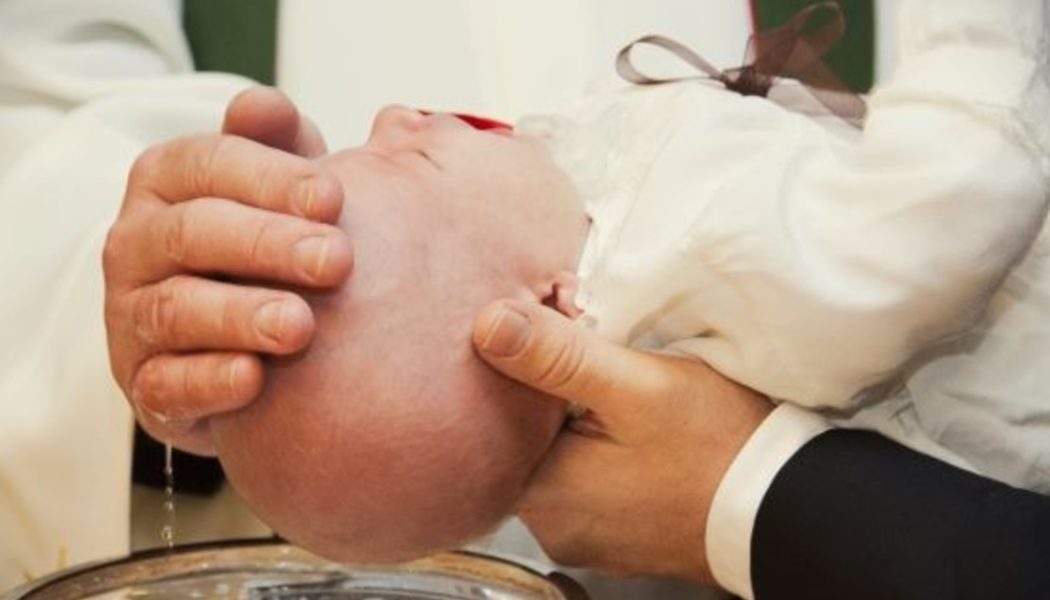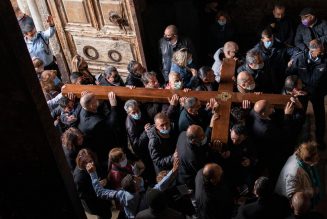
A woman who wanted to ask some questions about baptism called her local parish. After she got off the phone, she sent me an email about what happened. The parish worker who answered the phone was blunt and unkind – NO! You can’t have your child baptized without being registered at the parish. There was no way around it. The woman was distraught. Her family had baptized children in the Catholic Church for generations. It was something they always did and wanted to talk about it with me.
- Why is it so hard?
- Why all the hoops to jump through?
- Why don’t they understand me?
If you have ever worked in a parish and are like me, then a hundred problems start to creep into your mind during these kinds of situations. Parishes, priests, Catholic lay staff – none are supposed to be just Sacramental assembly lines, where we start with the raw material in order to create “good Catholics” which are spit out at the end – but we can certainly feel that way. So many people to get prepared for baptisms, weddings, Confirmation, etc. So little time and people to help us get them prepared. We get stretched thin, as staff, and then fall back on the classes, videos, etc. that never seem to change anything. Stuck in a cycle which maintains the status quo, we don’t know what to do.
Furthermore, we can’t just give out the Sacraments incognito or without hope that there is some kind of living faith that will be carried out. So, what are we supposed to do with all of this? How can we change things?
Well, I believe there is a lot we can do and I hope to make a few practical suggestions that can help us shift from seeing Sacramental formation as forms and classes into relationships and conversions. Of course, I can’t answer all the issues in one blog post. But, I do hope this can give you a starting point to launch into something better.
We all need to remind ourselves of this – most folks who are coming to the Church to receive a Sacrament (or for a funeral, pastoral care, etc) will be doing so during big events in their lives – births, marriages, deaths, etc. So, we need to honor this fact – these moments are REALLY BIG DEALS! We need to be with them to celebrate, mourn, and journey with them. This means we must start with relationship. Yet, as with any relationship, we need to build trust and the first step of trust is making a good first impression. (Yes, that means having a good website – with language that isn’t too churchy – but I won’t get into that here.) What I am aiming at is hospitality. Radical hospitality is the first step. If you don’t know what radical hospitality might look like in a Catholic parish, then I suggest you read up on it here.
FIRST THINGS FIRST
To imagine what it looks like – put yourself in the women’s shoes at the beginning of this post. I imagine the phone call to have gone something like this:
- Parish Worker – “St. Meany’s, how can I direct your call?”
- Caller – “Well, I am not sure. I need to talk to someone about getting my daughter baptized.”
- PW – “I can help.”
- C – “Wonderful. Well, can you tell me what I need to do to schedule a baptism?”
- PW – “First of all, we don’t schedule them for individual families, but do them every 2nd Saturday of the month. But, before you are able to schedule a baptism, you will have to fulfill all of the requirements first. Are you a registered parishioner?”
- C – “Um. No. Is that a problem?”
- PW – “Well, we require that anyone who has their child baptized is a registered parishioner and is on our mailing list for donation envelopes. You will also need to attend a class, along with the Godparents, fill out a number of forms, and do XYZ too.”
- C – “……..”
Not exactly hospitable, is it? Well, it isn’t abnormal that the first conversation goes like this. Now, there is nothing wrong with having requirements for folks to have to fulfill before getting a child baptized, before getting married, etc. The Church takes the Sacraments seriously and so should we. So, this isn’t so much about changing the rules as it is changing our behavior, goals, strategy, and attitude.
Yet, in the midst of the rules and programs we have created hoops that rarely change lives, rules that don’t lead to conversions, and Sacramental formation that is more about what we do rather than the people going through the process.
How could this call gone better? Well, here is a sample of what could have been:
Parish Worker – “St. Not so Meany’s, how can I direct your call?”
- Caller – “Well, I am not sure. I need to talk to someone about getting my daughter baptized.”
- PW – “Congratulations! That is great news! I would love to be able to help you with that.”
- C – “Wonderful. Well, can you tell me what I need to do to schedule a baptism?”
- PW – “Yes I can, but before we get into the details, can I have your name?”
- C – “Sure. My name is Mary Jones”
- PW – “Hi Mary. My name is Joseph. I would love to answer questions you might have about our process of baptism, but we here at St. Not so Meany’s believe that nobody should go though such important event, as baptism is, alone. So we are overjoyed at being able to help you through this process. The first thing we always do is have you schedule an appointment (which will be whenever is convenient for you) to sit down with one of our baptism team members, to walk you through the process, help answer your questions, and be your guide during this time. But, you can always ask me a preliminary questions now too.”
You can finish the rest for yourself. Notice the difference. While the first negative example is focused on WHAT needs to be done, the second is focussed on WHO is going through the process. It was personal.
What actually happens is that the attitude and behavior have changed from rules / process toward hospitality / evangelization. Thus, the person is not just another number being rushed through the Sacramental factory.
NOTE – Many ancient societies had obligations of what hospitality was supposed to look like. The host, was to provide for the guest, even when a stranger. This idea of what hospitality was like, was important in Jewish culture and early Christian culture. We need to regain this idea that we are obligated, as Christ-followers, to be hospitable to those who come to us in need…especially those in need of grace! For more on hospitality, we suggest you read the linked post above.
SECOND THINGS SECONSD
Think of what generally happens next for this parent. They register for a baptism class. Then they attend and fill out paperwork. Frequently, videos are shown or a short presentation is done about baptism. Then questions are answered and the baptism takes place. There is no follow-up.
Nothing changes in the family’s faith life and we wonder why……..
How could this be improved? Well, there are many different paths that we could go down, but I believe all of them need to have a personalized accompaniment as an integral part of them (see here and here for more on this relational model of ministry). This might look like having a well-formed parishioner (who is also a Missionary Disciple), walk with each person through the process. Think of this person as a Sacramental Sherpa. Someone who helps the others find the way and carry their burdens. We need not have staff who have to do everything. The staff at the parish could do the initial meeting, matching with host, coordination of the program, training of hosts, etc. This would mean a lot of work to get it up and running, but in the long run, it multiplies the staff member to be able to do less day-to-day work and gets more parishioners to take ownership of the process. It also helps those going through the process to have access to individualized help.
Some of the questions parish staff might have are:
-How and where do I start with such a shift in how we operate?
-What are the steps that I need to do to work in such a manner?
Let me try and answer these questions.
-How and where do I start with such a shift in how we operate?
Can you identify folks who are missionary disciples who might be willing and able to help with such a process? If not, then you will have to start forming them yourself, through an intentional process of evangelization and maturation process of accompaniment.
-What are the steps that I need to do to work in such a manner?
Draw up a plan. Know what you will do and what others will do. Set up a timeline for when things need to happen, who is doing them, and exactly what needs to get done. This includes, but isn’t limited to, these things:
- Finding others to help.
- Knowing what is required by the diocese, canon law, catechetical documents, etc.
- Training those will be accompanying others. The best way to do this is to accompany them yourself, so they can see a model of accompaniment lived out.
- Updating all documents that talk about the process.
Remember, your goal should be conversion of hearts, not just getting folks through the process and feeling good about it all. So, train folks on practical evangelization skills, including giving their testimony, preaching the kerygma and inviting a response, asking questions, listening, assessing where someone is in the thresholds of conversion and stages of discipleship, and knowing how to respond to what they need individually.
Go and make disciples sometimes means you don’t have to go anywhere to find folks who need to be evangelized, they will come to you. Don’t waste the opportunity!
If you want to know more about these topics, I encourage you to read the following:
Join Our Telegram Group : Salvation & Prosperity









